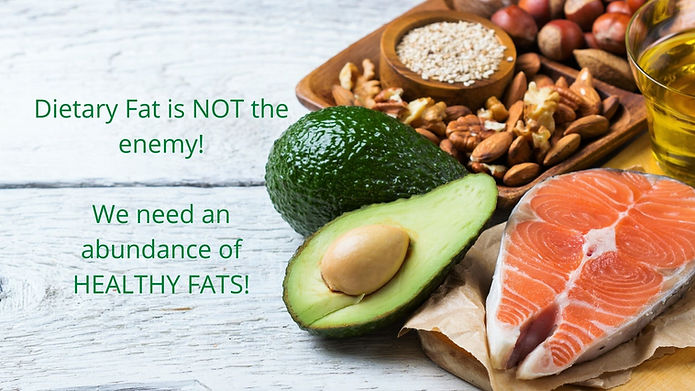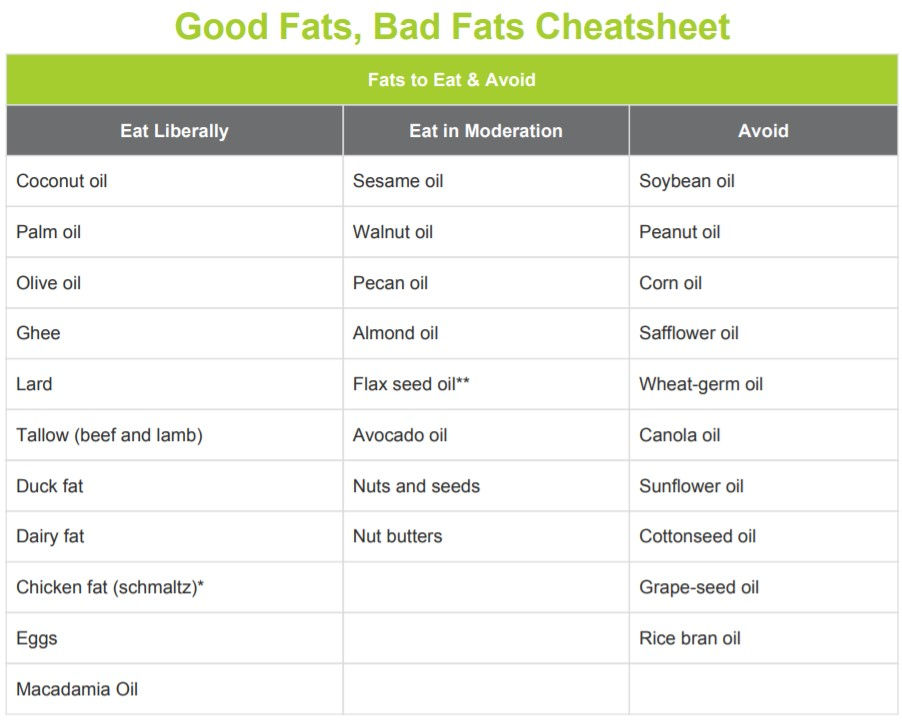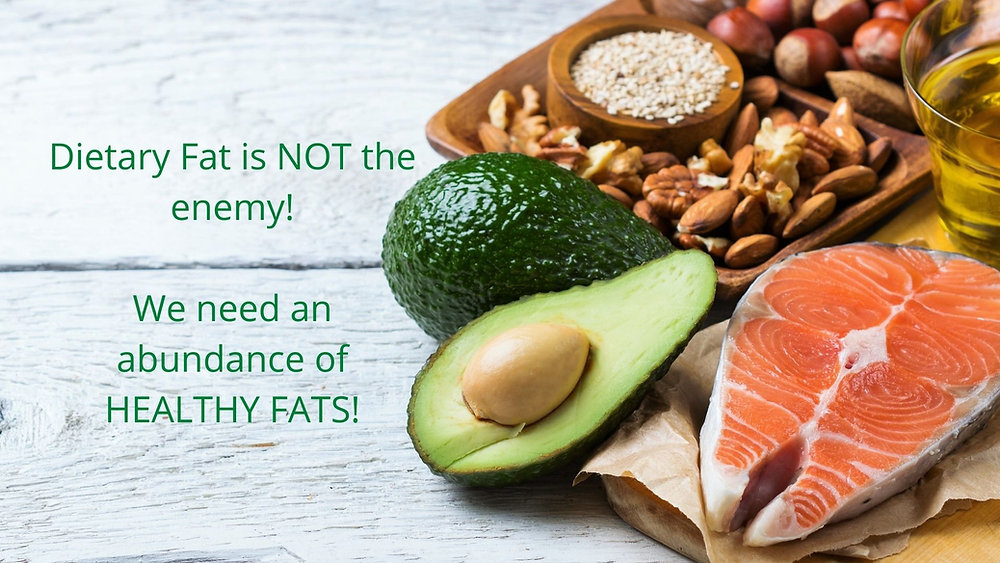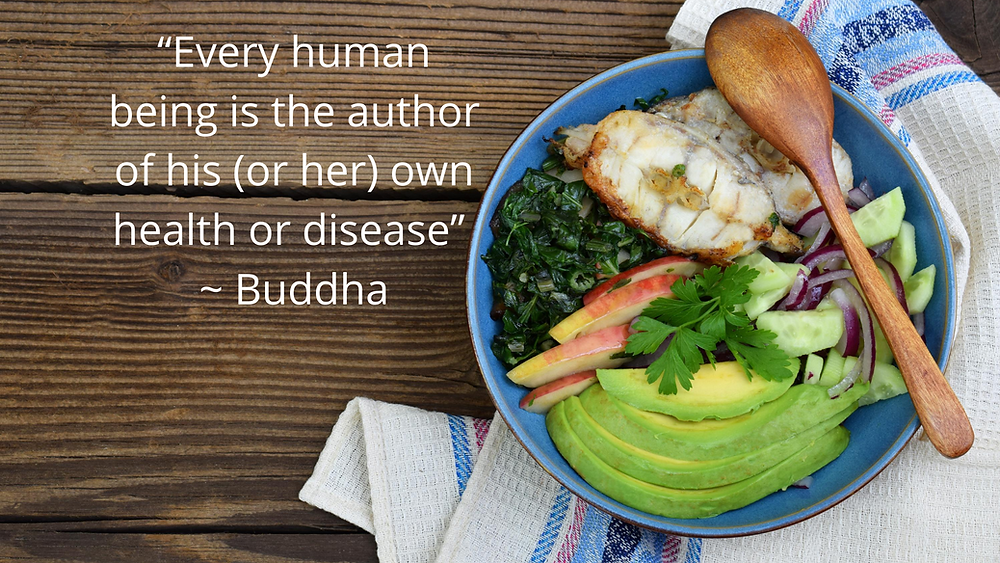
If you are anything like me, most of my young life I was led to believe that eating a low-fat diet was ideal. When I started to get my health under control 16 years ago, by addressing my nutrition, it was the first time someone told me I needed to start eating a lot more fat. My first thought was that eating more fat would make me gain weight. I made a point to only buy no-fat and low-fat products – but had I been getting it wrong all along?
Fast forward to now, and I find myself having this conversation with people often, and I see the same look on their face! The truth is that fat is a crucial part of the human diet. The key is that the fats need to be the right kind of dietary fats. And it is also important to mention that it is not fat that causes weight gain, but rather it is eating excess carbohydrates, which in the Standard American Diet (SAD) are typically processed flours and refined sugars. Then we also have the issue of excess consumption of the wrong kinds of fats. Let’s delve a little deeper!
What is so important about fat in our diets?
Dietary fats are essential for maintaining good overall health, at any age. "Your body needs a regular intake of fat," says Vasanti Malik, a research scientist with the Department of Nutrition at Harvard's T.H. Chan School of Public Health. "Fat helps give your body energy, protects your organs, supports cell growth, keeps cholesterol and blood pressure under control, and helps your body absorb vital nutrients. When you focus too much on cutting out all fat, you can actually deprive your body of what it needs most." This thinking is sure to challenge what many of you thought up until now!
Below is a more comprehensive list of how healthy fats benefit the body:
Fat is required for the absorption of vitamins A, D, E, and K, all which are vital to our bodies
Fats play a key role in brain health, and thus mental health – the brain is made up of mostly fats and certain deficiencies can result in various types of cognitive impairment
Fats are an important component of your cell membranes – the outer layer of cells, and they also aid with cell signaling and repair
Fats transport cholesterol from the liver to all the various parts of our bodies that use it for cellular structure and repair, steroid hormone synthesis, and the insulation of nerve cells
Healthy fats are essential for a healthy gut, especially the gut barrier – when the gut barrier is compromised, it can lead to a wide array of chronic inflammatory diseases
Fats regulate blood sugar, as they slow down the absorption of carbohydrates, helping energy levels remain stable, and keeping you satiated longer
Fats support healthy hair and skin by helping them retain moisture, which in turn helps maintain our body temperature and prevent dehydration
Fats affect eye health – DHA in particular is found in the retina in a high concentration
Fats affect hormones and fertility, in both men and women
Fats are the primary way we store energy
What symptoms do we see with a diet that is too low in healthy fats?
Clearly, as seen above, the benefits of eating ample healthy fats are vast, and we could add more to the list. But what happens when we are not getting enough fat in our diets? If fats play such a key role in our bodily functions, then it would seem logical that a diet too low in fat would cause a wide scope of health concerns. Yet do we ever look at a health concern and even consider that we need to eat more fat to address it? Maybe this will change your mind a little.
Some of the symptoms of dietary fat deficiency include:
Dry rashes
Dry, brittle nails and hair
A weaker immune system
Poor concentration
Fatigue
Joint pain
Constipation
Hunger after eating
Other various issues related to vitamin deficiencies
What kinds of fats should we be eating?
Eating a good mix of different fats helps support health and wellness. But not all fats are created equal. Below is a chart that breaks down fats into the ones you can eat liberally, fats to eat in moderation, and ones you should avoid completely.

The first question I get with this list is always about the fats you should avoid completely. If you grew up eating a SAD, like most people in the US, then these fats were a regular part of your diet. These industrial seed/plant oils are NOT heart healthy and in fact are high in calories, low in nutrients, and prone to oxidative damage. They are also high in omega 6 (linoleic acid), which is part of a healthy diet, but promotes inflammation when overconsumed. Ideally, the ratio of omega 6 to omega 3 should be around 3 – 4:1, yet in the US that ratio averages 15:1, limiting the anti-inflammatory effects of the omega 3s. (See our blog on Omega 3s and 6s for more info).
Unfortunately, the low cost of these cooking oils, combined with marketing by the oil manufacturers, has made these oils a staple in home kitchens and in restaurants. It is quite extraordinary, considering these oils were not consumed in human history until the early 1900s. We would recommend you remove them from your pantry and be thoughtful about where you dine out, and what products you buy. Read the labels! Better yet, eat a whole food-based diet!
What about saturated fats and high cholesterol?
You will notice that some of the fats in the “eat liberally” category are saturated fats. Hmmmmm, that is odd, you might say. Then you might be surprised to know that the US Dietary Guidelines changed their recommendations to no longer include any restrictions on dietary cholesterol, which is a huge shift from the prior stance on limiting saturated fats. These guidelines changed because for many years now the science has shown that dietary fat does not raise blood cholesterol for most people (but for some it does). In fact, only about 20 percent of the cholesterol in your body at any given time comes from the diet. The rest is made by your liver, because cholesterol is an essential nutrient, as mentioned above.
So the days of eliminating the egg yolks or avoiding red meat are changing. Considering the nutrient density in egg yolks and in quality red meat, this change has been welcomed by many. It is still important to hone in on the best quality though – grass-fed, pasture-raised, organic, etc. And if you do have issues with high cholesterol, then focusing on fats from cold-water fish, avocadoes, and olive oil is ideal.
How much fat should you eat?
We have covered why dietary fat is crucial in our diets, as well as what types of fats are ideal. The next step is to dig into how much fat we really need. I will start by saying that when discussing healthy fats and how much to eat, we are coming from the perspective of a whole foods diet, free of processed food. Whether you call it paleo, ancestral-style eating, or clean eating, the context is within a framework that is based in high quality proteins, abundant vegetables, fruit, and healthy fats as the foundation.
Fat is one of 3 macronutrients; the other two are protein and carbohydrates. For general health (NOT for weight loss and some other conditions), the standard recommendation is: 15-20% protein, 20-30% carbohydrates, and the rest would be from fat, so 50-65%.
For weight loss, the targets change a little: 25-30% protein, 10-15% carbohydrates, and the rest would still be from fat, so 55-65%.
As you can see, the amount of fat we eat does not change much when we transition to weight loss, but rather the protein increases and the carbohydrates decrease. Protein is highly satiating and supports blood sugar regulation, so eating more protein is beneficial when trying to lose weight. Reducing carbohydrates is where we really allow our bodies to lose fat, as the body will always use glucose first (blood sugar, which is increased with carbohydrate consumption), as this is a more readily available fuel for the body. When the body cannot depend on glucose, it uses fat as the primary fuel, thus shifting the body to fat/weight loss. To take it one step further, the carbohydrates you are eating should ideally come from non-starchy vegetables, supporting weight loss even more.
If you are not sure what your ratio of macronutrients currently looks like, there are some great apps out there that you can enter your meals into to get a better idea. Cronometer and MyFitnessPal are two popular ones. For those on a typical SAD, the results often show that their diet is lacking in fat and includes far too many carbohydrates. The important thing is to know where you are right now, so you have a starting point to work from as you make changes to your nutrition and lifestyle.
To wrap it up...
Hopefully this blog has helped shed some light on how dietary fats get a bad rap, when fats are actually essential to our bodies. Our hope is that your take-aways include:
Dietary fat is vital AND you may not be eating enough of it
Not all fats are equal – the chart above is a great starting point
Saturated fat is not the big, bad evil we once thought, but it should be moderated for those who are prone to high cholesterol
Fat is not the primary cause of weight gain as most people believe
If you need professional support making nutrition and lifestyle changes that are based on a whole foods approach, combined with understanding your ”why” (what really motivates you to change) and how to harness it, then reach out for a free consultation today.
Yours In Health ~ Jeanna

jeanna@lifestyle-evolution.com
Our work is fully virtual and we support clients all over the US!
#virtualcoaching #healthcoaching #healthcoach #functionalhealthcoaching #behavioralchange #cleaneating #ancestraleating #nutritioncoach #nutrition #clinicalnutrition #paleo #eatingforweightloss #Weightloss #healthandwellness #nutrientdense #aip #lifestylechange #sustainablechange #selfcare #healthyfats #dietaryfats




